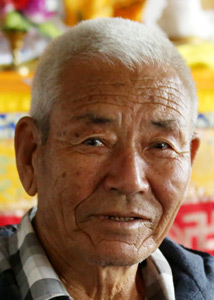 |
As nomads we migrated four times in 12 months. We took the whole home. They were tents made from tsipa, the hair of yaks that were woven into tents. The belongings were loaded on yaks and moved here and there. Things loaded on the yaks were kitchen items, tents, blankets, mattresses and everything. It was very simple in Tibet. There was no need to transport chairs and tables like these. We were like tourists, like trekkers. There is a particular place to stay during summer and then there is an autumn site, a spring site and a winter site, moving every three months. The animals must feed on grass and the grass depleted. Then we moved to another place where grass grew. Without grass all the animals will die. As a nomad I liked herding the animals like yaks and sheep. One must take care of them and let them multiply and then one became rich. If one did not take care of them one became poor and faced problems. |
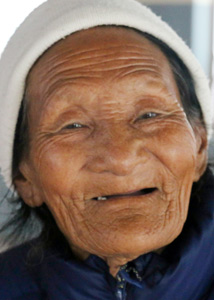 |
I was with the animals from morning when they were let out until they returned in the evening. That was the regular duty. Mother used to say, “When my daughter gets married one day, the new family will not like it. She does not know any household duties being out in the mountains all the time.” My kind mother used to worry so. From a young age I was always out with the animals and except in the mornings and evenings, I never did any household duties. I was with the animals and spun wool at the same time. My work was herding sheep and yaks. I liked it very much. I am now old and near death and feel pain in the heart that I have not been able to see the animals. I remember that the land was good and I enjoyed herding the animals. Even now I remember how happy it used to be. |
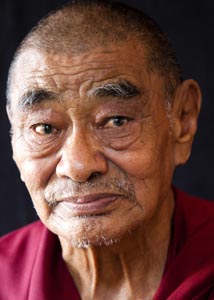 |
We went to gather salt using the animals. The trip to gather salt took around two months. The salt is found like sand in the depth of the lake. Four men with small strips of yak leather entered the water to gather the salt that lay like sand at the bottom of the lake into the strips of leather. They carried the salt out of the lake and created a pile. The salt was heaped and that dried completely in a day. Each yak was loaded with two sacks. It was not just a sack but quite a heavy sack, maybe around 30 kilograms. For instance, mine is a middle class family that transported around 25-30 sacks. We must load the salt on yaks because there were no vehicles. On the way to buy grains we took salt and returned with all the yaks fully loaded with grains. The farmers required salt and we required grains. So grains and salt was exchanged. |
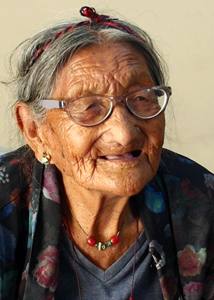 |
I went to a place called Dakyap near our house to herd sheep and an eagle took away a sheep. Oh, my! I screamed and screamed. Poor lamb. The lamb was born with my help, born in my hands and I used to put it in a carrier on my back. That day I had not put it in the carrier and let it loose with the mother. The eagle took it way up into the sky. It was a beautiful lamb. It was such a loss and I cried so much. After a while the lamb fell down and then a wolf snatched it. The dead lamb was snatched by a wolf and I was helpless. There was nothing for me to do, nothing to do but cry. There was great danger from wolves and eagles. |
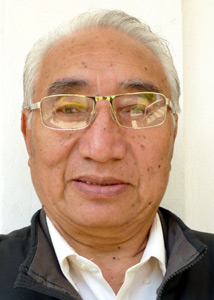 |
My father was one of the ministers of the King of Derge. The duty of a minister was to look after the welfare of the people. My father said there were never any problems during his tenure. Others did have big problems. In such cases there were the four chief governors, the King, the five head lamas and in addition, if required, the 38 ministers—everyone gathered together to settle a very serious problem. Everyone got together to discuss and reach a conclusion, which was put down in writing. There was a seal, too. When the seal is stamped only at the bottom [of the page] it indicates that one can petition a review of the case and if the seal is stamped facing downwards it indicates that the decision is final without any reconsiderations. |
 |
My father imported goods from China and India, and then exported wool, musk, herbs and other things. When he came back from India, he always brought things for us children. I remember getting ribbons—hair ribbons because you know, the Tibetan ribbons are very different from the Western ribbons...The Tibetan ribbons are woven. They’re silk threads that are woven and you weave that into your braid...So he would bring them for me, hair clips, jewelry but my favorite I think, I always remember was bubble gum. He brought so much bubble gum and I was very popular in school when I had bubble gum to share. When he imported things, merchandise from China, he would travel down to eastern Tibet, to Dhartsedo to bring in tea and other manufactured goods, from silk, brocade and…bowls, porcelain cups, bowls, jade…Well tea, of course--I mean, how can we live without tea? And silk and brocade, because all of our formal wear, all the blouses are made of silk, the chupas ‘traditional dresses’ are made of brocade for formal wear. So those came from China. |
 |
On the north side of our town is the mountains. Mountains begin with meadows and gradually going up. Then you have the rocks and things and then high up, snow-covered mountains. Beautiful. On those slopes of the mountains we have our Tibetan mills. The force of the water churns the wheel and then we make our tsampa ‘flour made from roasted barley’ there. I think on the south side is all plains. That’s where we have all our agriculture fields. From my home, our agricultural lands are located at least maybe like three miles away. We have a homestead with Tibetan animals like sheep, yaks and cows for the household. But then we have a small section of nomads who live up in the mountains. The land is very productive. We had good river systems. So even if rains do not fall in time, we always can use the river system to irrigate. |
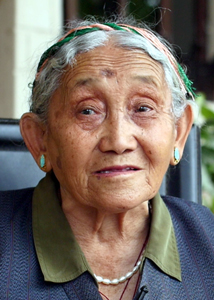 |
At the age of 17 or 18 I went into the service of the Phuntsok Phodang. For us the [residents of the] Sakya Phuntsok Phodang ‘Palace’ and the Sakya Dolma Phodang were our lamas and leaders. I asked my parents to let me go to serve them and that is how I went. The dhungsay ‘sons of the clan’ were born to the dhagmo [wife of His Holiness Jigdal Dagchen Sakya Rinpoche] of the Phuntsok Phodang and I became the nanny. The dhungsay were special, being high caste, and we were not allowed to touch anything dirty outside. I must remain clean in their service. As a nanny one looked after the children like your own children. It entailed playing, feeding and dressing. One was not given just any kind of work because then you would not be allowed to touch the dhungsay. It was enjoyable. Of course, the father was a lama, and the dhagmo was very good and gentle. I was more in authority. There were only two sons and no daughters. They had tutors and other attendants to play with—there were attendants for different activities. |
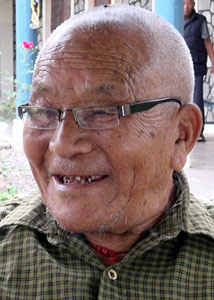 |
At daybreak you had breakfast and then took the cattle and sheep to graze. The cattle must be protected from wolves and taken to where the grass was good. In the evening, around dusk you brought them back to your village into the enclosure. The women milked the dri ‘female yaks.’ And then at daybreak, when the sun rose one took them to graze. There was no education then and one was very happy. There was good food, thanks to your parents. One felt happy being with the animals, then drinking milk and churning curd. There was tsampa ‘flour made from roasted barley’ in Tibet and one added butter and made pa ‘dough made from tsampa and tea’ from it. Then cheese was kneaded into thue ‘soft creamy cheese’ by adding brown sugar. And then animals were slaughtered and the meat dried well. There was no practice of using currency but the wool of animals, butter and cheese were used. Everyone was extremely happy. Our livelihood depended upon the fur and wool of animals, curd, milk and meat from the slaughtered animals; these were utilized. One did not fail to remember that it was due to the benevolence of the lamas and gods. |
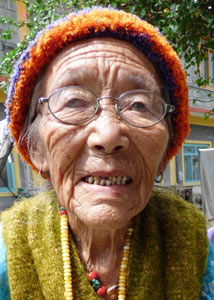 |
Raising a child was not like it is here now. In the morning you breastfed the child and lay it to sleep and the mother went to work. When you came for lunch you breastfed the child, changed diaper and lay it to sleep. Then it was time for the mother to go. Other than that, one need not carry the child or anything like that. While doing fieldwork the neighbors and grandparents at home watched my daughter. I came home for lunch. My earlier marriage did not work and I was determined from the depth of my heart not to remarry considering my child. If my parents and elder brother lived long I had no suffering. I was able to fill my stomach and my relatives were all together. What would I do with a husband? That is what I thought. I did not remarry as one did not work out and I did not want to do it again. I felt happy being single and doing my work. |
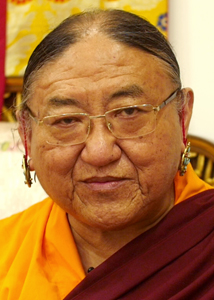 |
I think the Buddhist teaching is very important—relevant in this modern time—generally, I believe all the religions, all the world’s major religions are important for different reasons…for different people just like we need many different medicines for different diseases, one medicine does not cure every disease. So therefore, the variety of spiritual practice is necessary to a variety of the people. But the Buddhist teaching is very relevant in this modern age because it is not just…Buddha’s teaching itself says that you should not just go by faith alone. Although all the Tibetan Buddhist schools are the same, each has its own kind of special characteristics. Some schools emphasize more on meditation, some schools emphasize more on the study, some schools emphasize more on…But the Sakya school emphasizes equally, on study as well as meditation, together. So that is a more special characteristic, and with that we can make some contributions to the wider audience or the variety of people. |
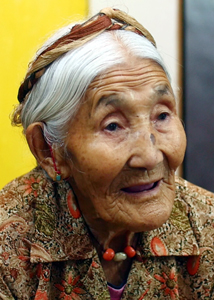 |
I became a nun around age 17 or 18 as a form of tax. My parents had two daughters and the tax required that from the two daughters one become a nun. So I became a nun as a form of tax. There were 30-35 nuns and there were four umze ‘chant leaders.’ These four nuns lived permanently at the nunnery. They read the prayers while we remained silent. At the age of 15, 16 or 17 one just chanted the mani ‘mantra of Avalokiteshvara.’and did not know any reading or writing. There was not anyone teaching. One just had to live there. After the assembly you would be told to go back home on leave. The rest of the nuns went back to do whatever work there was to be done at home. There was not anyone who said she wanted to become a “permanent” nun. I did this only for around two years and then we fled to India after the Chinese appeared. |
 |
The ngagpa ‘shamans’ lived in their monasteries in the mountains. Some of them lived in small caves, while others who had sponsors lived in tiny wooden houses, and sat meditating. The ngagpa lived there for months and years in retreat. We went to deliver them food, salt, matches, oil and tsampa ‘roasted barley flour.’ One could not come within a distance of 5-6 minutes from their dwelling places. There was a demarcation line, stones painted with white lime where we place the things we had brought. They could not speak while they were in retreat. They ate only one meal a day exactly at noontime. They had a wooden seat made to measure a cushion and sat on it day and night. There was no lying down to sleep. Ngagpa have powers. We would not have faith in them if they did not possess powers. We believed in them from the depth of our hearts. |
 |
There were never any schools in the villages. It was very poor. So, since any boy could learn to read and write, and study culture and science in the monasteries, he was made a monk. Whereas in the case of girls, right from the beginning, except for work, there was no plan for teaching them to read and write. I stayed in the monastery a little bit around the age of 12 or 13 and not at any other time. I stayed a little bit in the monastery a year or two before leaving for Lhasa. The reason for going to Lhasa was to study the Great Treatises of Mahayana Buddhist Philosophy. Generally, among the monks of the local monasteries those that have never been to Lhasa have fewer rights. Going to Lhasa and earning a geshe degree is excellent. Having been to Lhasa and lived for three years in a great monastery, and upon returning to the village one was deemed of great value. That was the reason for sending me to Lhasa. |
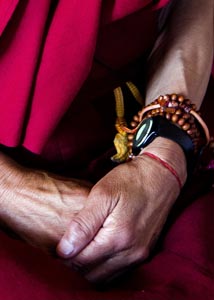 |
It is possible that you have a certain degree of anger. However, His Holiness the Dalai Lama always teaches about not having anger. When we lived in Tibet the people were desperate, “His Holiness the Dalai Lama is a Buddha and speaks about practicing tolerance. However, instead of tolerance we wish we could eat the flesh and drink the blood of the Chinese.” Now I have seen His Holiness the Dalai Lama and learned about practicing love and compassion. I pray, “May the Communist Chinese turn to the dharma.” Even among the Chinese, it is not every Chinese. “May their mind turn towards the dharma and come under His Holiness the Dalai Lama. Please God, let their mind be directed towards pure and total presence,” I pray. Earlier I was angry but now after seeing His Holiness the Dalai Lama’s countenance and His Holiness’ many teachings…I have become a nun and practice tolerance and pray for them that their wrong attitude transforms to Buddhism. |
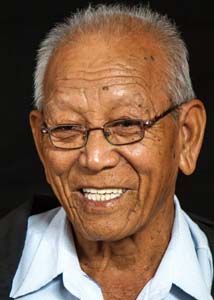 |
I became a monk at the age of 11. Since we were village children, we felt happy to become monks. One must do a lot of work at home like herding cows, goats, sheep, pigs and cattle, and also do fieldwork. Everybody remarked that by becoming a monk one could study and be happy. As the monks became older, along with studying the scriptures, they undertook duties like serving tea and other tasks. I learned to play the longhorn and clarinet and continued to play the longhorn and clarinet for around 12 years. After the completion of 12 years, one generation has passed on and the responsibility is handed over to the younger generation. There were 80 longhorn players and 80 clarinet players. The instruments are used as accompaniment for ritual offerings—so except for religious purposes, they cannot be played indiscriminately. The horns have been in use in the past, many centuries ago by our ancestors. Earlier in Tibet there used to be monthly performances requested by the Tibetan Government. Other than that, the instruments were only played during the initiation ceremonies of lamas and tulku ‘reincarnated lamas’ at monasteries, graduation ceremonies of lamas and tulku, or when His Holiness the Dalai Lama came to a prayer assembly. |
 |
I wanted to perform prayers, study and practice the Buddhist dharma. I lived in a cave, eating roasted barley flour and drinking water and sleeping there too while at Mount Kailash. Then I met a Rinpoche [respected lama]. I told him, “Rinpoche, I pledge to spend my whole life in this way practicing the dharma, which will benefit the many that died and have been killed. But I perceive the Chinese as enemies.” Rinpoche replied, “If you feel like this, it is worthless continuing your practice. You must understand that there is only love and compassion and no difference between enemy and friend in the dharma. If you practice this, the enemy will not be the enemy but like your relatives, siblings and parents.” I had to put in tremendous effort to learn. I did pilgrimages and prostrations around the mountain—I meditated and made every effort that I could. According to my experience every one of us, does not desire any kind of suffering. Through practicing peace one realizes that the problems I suffer are also felt by the other person. |
 |
Their main objective was to deceive. For instance, when the Chinese initially arrived they said, "We have come to help you but will not remain in your country. Once you are well established we will go back." In that way the Chinese spoke sweetly and later brought a large number of soldiers such that the whole of the city of Lhasa was filled with soldiers. Therefore, if their actual objective was to help the Tibetans there was no need to bring soldiers. Surely China has many others other than soldiers to extend help, right? So if it was actually helping by providing training in cultivation or trade--if it was to benefit people, there was no need to bring soldiers. When the region's surrounded by soldiers, it clearly reveals that it was not good. |
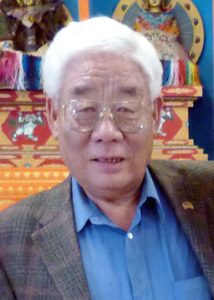 |
The first encounter with the People’s Liberation Army was in summertime. There were about 70 Chinese soldiers that came over. We had never seen Chinese before except some Muslim Chinese business people who used to sell clothing and candies and sugar, tea, etc. All of a sudden people were shouting and saying, “The Chinese are coming. The Chinese are coming.” At that time the Chinese were very nice because Mao himself has instructed not to even take a grain of rice from the people. So those were the days that they were trying to pay for everything and be nice every time, you know, but they got worse and worse. We heard this rumor that Chinese were eating the old people and little kids. So I was hiding behind my great-grandfather. The Chinese came very friendly and my mother gave them some tea, then yogurt and with what we call doma, which is wild, small sweet potatoes. They drank milk and yogurt and they stayed overnight. They gave me a lot of candies. They gave my father a couple of bottles of whiskey. They brought a lot of posters of Mao and most of the Chinese leaders in a group picture. That was their propaganda to introduce to the Tibetans who the leaders were besides Mao. |
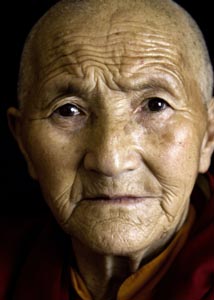 |
I was 12 years old when I first saw the Chinese. People were desperate and wondered how to surrender and feared being shot dead by the Chinese. It was said that all the people in the village would be killed. I volunteered to wave a khata ‘ceremonial scarf’ and thought it better to surrender because it would be terrible if all the people of the village were killed. It was said that to surrender I must hold a long stick with a piece of wool in place of a khata ‘ceremonial scarf’ and wave it. So I waved the stick thinking, “I will be killed.” I hoped that with the blessing of the gods everyone would be saved that day. I was crying as I waved. When the Chinese fired shots in our village, one could hear the sound of bullets whizzing by. The bullets fell to the ground spraying dust. Everybody kept inside their homes. They fired shots and either arrested or killed everyone. After the firing stopped, they came and the village filled with Chinese. A great number of soldiers had arrived. They held meetings and asked, “How many family members do you have? Where have the family members gone? Where is the children’s father?” My father and the others were gone but none knew that they had been captured by the Chinese. My older sister was forced to transport supplies and I was taken to construct roads at the age of 12. I have seen every kind of incredible suffering. |
 |
When the Chinese first appeared, they did not have vehicles. They arrived on camels and horses. The soldiers seemed hungry and stayed there rather poorly. It looked to me as if they were facing a lot of difficulties. I think I was 10 or 11 years old when I saw them come. Some people remarked that they were Chinese. They arrived but did not cause any problems to us. They engaged themselves in work. When we were harvesting our crops, they came to assist us. That was at the very beginning. When they first arrived, they were in civilian clothes. Much later the soldiers wore dark blue. Those that appeared initially were dressed in white. When they first appeared, their attitude was such that they seemed humbler than us. Besides saying that they were going to help us in the future, they were extremely humble. I did not fear them nor did it ever come to my mind that they even had a country of their own. I thought they'd just wandered around and came to live in our village. It never ever occurred to me that they would occupy our country. |
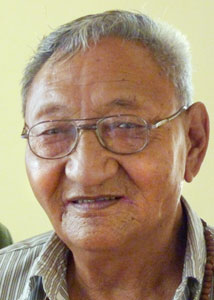 |
The Chinese had arrived in Lhasa by 1949. They set up a sort of modern school and all the children thought it was fun. There was singing, dancing, learning…Basically, even at that time we did not like the Chinese and on my part, I did not wish to attend. Without any rhyme or reason the Chinese thought only about occupying Tibet and did not come to Tibet with good intentions. Older people used to tell a story that Chinese policy was like a wet leather cap. When it was initially worn over the head, it sat loose because it was wet. Then it gradually began to tighten and when it was dry, it constricted. The Chinese were being deceitful at that time. They brought in huge amounts of dhayen ‘Chinese silver coins.’ If one performed a small task, excessive dhayen were paid. At that time they were deceiving the richer families by giving presents like towels, soaps and photographs of Mao Zedong. They were doing such things. On our part, we rented them a house to stay during their travels. We did not make any other contacts. This was there at the tip of their tongue. “We have come to help the Tibetans in Tibet. When you’ve made good [progress], we will go back,” they said that on one hand and on the other… We knew they were deceiving us, but no one directly confronted them as such. No one knew much of politics. |
 |
The Chinese first appeared on Tibetan territory in the 3rd month [of the Tibetan lunar calendar] of 1949. I was a soldier at the time the Chinese first appeared. I served as soldier on account of the monastery. Many tens of thousands of Chinese had arrived and they filled the region. It was similar to what it is now and there was no end to their numbers. However, ours was a small village and there was no space for them to arrive in full force. They had to come through narrow accesses, which enabled us to defend ourselves. I was 16 years old then. Then we lost our territory. After the territory of Chamdo fell, it was said that everyone had to surrender and that was what we did. When they first appeared, they gave food supplies and white dhayen 'Chinese silver coins' to everyone. They lived there by deceiving the people. The soldiers helped the people in their work. What they did not do was that wherever they stayed, they did not pay house rent. However, they paid for the firewood they used and water was free in Tibet. They misled the poor and bribed them by giving money. They caused internal friction that way. Then the event took place in 1959 until the democratization of liberation process. Later when they announced that they were implementing socialism and communism and that was not accepted, they attacked Tibet in 1959. |
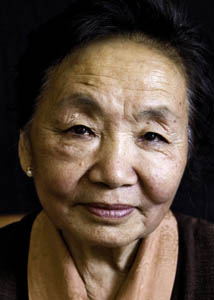 |
I was around 9 when he Chinese appeared in Lhasa, saying that they had come to liberate or some such thing. There were portraits of Mao Zedong and…was it Stalin? Their portraits were mounted on a big jeep. They came beating on something, blowing trumpets and making a lot of noise. However, most of the people did not like it when the Chinese first appeared. When the Chinese arrived, they were thought of as having come to make the Tibetans suffer and people felt fear. Whether the Chinese spoke sweetly or not initially, they were thought of as cause of suffering. Our family never thought that the Chinese were helpful to the Tibetans. That was because we heard many stories that in Kham, far away in Dhartsedho, the Chinese had captured numerous influential people, lamas and geshe ‘monks with a Buddhist philosophy degree’ and subjected them to thamzing ‘struggle sessions,’ killed, arrested or imprisoned them. As a child I heard many such stories that the elders spoke of. At that time there were no such things happening in Lhasa but it occurred on a large scale in Kham. |
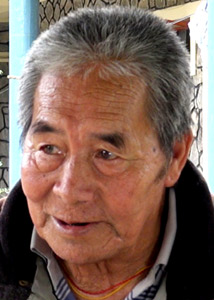 |
Initially the Chinese said, “We are friends and are like siblings from the same set of parents. We will treat you well. We will never treat you bad anytime.” The Chinese spoke sweetly and paid for food in the beginning. Then they grew worse and worse, grew rougher and rougher, and then spoke big, “If you do not obey the Chinese government, you have only one way to go.” It meant, “We will kill, execute.” I saw it. The Chinese did such things. The rich families were categorized in the wealthy class and their wealth was to be divided equally with those that did not have. [I believed that] the wealthy man had saved his wealth by working hard and if it was to be divided equally, he would not do so willingly and we would not want it. I never looked forward to receiving such wealth. |
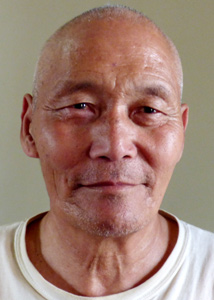 |
We could not endure the suffering inflicted by the Chinese. We were not allowed to see His Holiness the Dalai Lama nor give his name. Life was terrible under the Chinese. I swear. It seemed like nighttime with no happiness whatsoever. It was like being in prison from morning until night. And inside me was the suffering that I could not see His Holiness the Dalai Lama. The Dalai Lama is our heart and one cannot survive without him. I swear Tibetans cannot. We were not allowed to see His Holiness the Dalai Lama, see or hear [about him] and fled in desperation regardless of whether we died or lived with the hope to see His Holiness. It was the same for all of us, the Tibetans. |
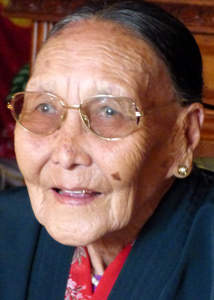 |
The happy times were when I lived with the parents. There was no happiness after the Chinese appeared. When the Chinese appeared they reformed the rich families, confiscated all the belongings, killed and assaulted people. We went to construct roads for the Chinese. It was difficult but there was no choice. One was forced to do it. Without earning a living one would remain hungry. My grandfather hailed from a good family and had servants and maids. So the Chinese put him in prison for a year and then was brought out at gunpoint and then killed. Everybody was called to watch. The Chinese forced Grandfather’s servants and maids to lie about him, “When we were servants and maids he did not provide food and beat us.” The servants and maids lied. They had collaborated with the Chinese. The Chinese distributed grandfather’s belongings to the servants. |
 |
Whatever possessions we had in the house, all these were seized by the Chinese and confiscated. Some were distributed among the people and the rest taken by the government. Whatever gold we possessed, even those worn on the neck were broken and taken away. We had no freedom then. They left the clothes, blankets and kitchen equipment but the rest of the belongings were taken away. It was not just us, but the “Democratic Reforms” were launched everywhere in Tibet. My father was imprisoned for six years. At that time the Chinese took him away from home in chains. No reason was given, only that he had to go. He was taken away on the pretext of being given advice or re-educated. Father was imprisoned somewhere near Lhasa and Mother went to visit once a year. If our relatives talked to us, the Chinese would punish them. So it was like we had nobody. Father was in prison and there were just stepmother and I and nobody else. If people wanted to visit, they came during the night. |
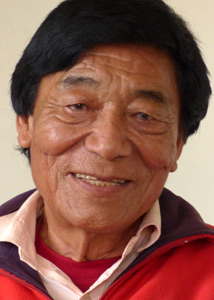 |
When captured by the Chinese there was great fear thinking about what they would do. However, even if there was dread, the men had caught you and there was nothing to be done. After arriving at the work camp in Kongpo I had the thought of escaping. It was easy to go to India from Kongpo. So I told my colleague, ""Hide a little bit of tsampa ‘roasted barley flour’ every time you eat. Save a little bit of tsampa, which we will eat when we escape."" He saved a little bit and I saved a little bit. And then one day carrying the little bit of tsampa, we ran away in the night through the barbed wire fence. We succeeded in escaping. But until I reached Indian Territory there was fear and panic thinking I might get caught. Once in Indian Territory I was extremely happy that now I will get to see His Holiness the Dalai Lama and need no longer remain under the Chinese. |
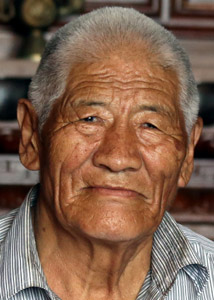 |
After arriving in the prison at Ngari Gar, I was handed over to their officials who were like policemen. That day they shoved me with guns and then shackled my feet with a thick, big chain. Then hammered a nail, as the chain was not the type where you have a lock and key. The feet were shackled and the hands in handcuffs. Then I was put in prison. In the inner prison where I was jailed were the two leaders of Ngari Gar, their district administrators and attendants, village heads of the whole region of Ngari, the wealthy and lamas of the various monasteries. We were altogether around 100 prisoners in the inner prison. Someone with a serious charge was kept alone in a cell. Most of the men were kept four in a cell while in the bigger cells were around 10. There were large cells. The food was very, very poor and one was hungry. Most of the people, when they fell ill, died. Many of the leaders of Ngari Gar passed away. |
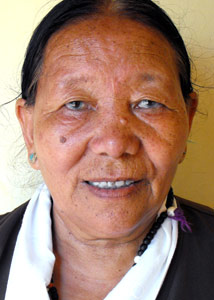 |
After His Holiness the Dalai Lama left Tibet, then the Chinese started to cause us suffering. A lot of meetings were called. They summoned all the fathers of the wealthy families. They were asked questions, “How much land do you own? How many sheep? How many yaks?” All the belongings of the home were documented. “What work do you do?” Lands were assessed and documented. My father was subjected to a lot of suffering. He was made to sit with his head down and the people were called to gather for a meeting. The Chinese said to some of our poor people, “You have been subjected to a lot of suffering” and they forced them to do thamzing 'struggle sessions.' It went on for a long time and some of them beat him. Such things were carried out about 11 times. There were some [poor people at the meetings] who were good and spoke nicely. There were others who beat the prisoners a little. They had been misled by the Chinese. Some did it with the thought of obtaining wealth. They were our relatives or people of our village. They were never allowed to mix with us. We were banned from having any interaction with the majority of the people, not even to speak to them. The other wealthy family and ours could converse. The doors of our house were sealed, meaning that one could not touch them. The Chinese allotted us with two rooms. Even though we owned many rooms, we were not permitted to use them—just these two rooms and some grains. Even though we owned a flock of sheep, we were given only 16 or 17. |
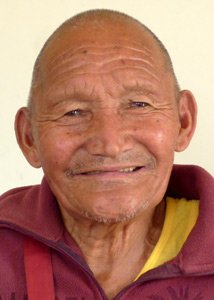 |
he monks fought the Chinese. When the Chinese came to destroy the monastery, the monks resisted and fought and thus were killed. Many monks were killed. The Chinese captured the monks or killed them. Actually Jophu Monastery, Gophu, Dhiphu, nearly all the monasteries were destroyed. The Chinese did not leave one monastery standing. They destroyed every monastery in sight. Later some were built anew and presently there are some to be seen. Otherwise, the Chinese took away all the images and Buddhist scriptures. When the monasteries were destroyed and when people were being killed or arrested, there was no way one could remain but to escape. So all of us escaped and reached here. I fled and arrived in Nepal. Otherwise, I would not be here. Had one not fled one might have either been imprisoned, killed or died of starvation. |
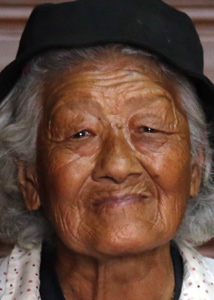 |
We were one of the richer families and there was another family in the village. We used to give loans to people and collect them during harvest time. So since we were better off, my husband was captured. The Chinese ordered the people to gather and during the gathering my husband was imprisoned. Called to a meeting and locked up. One must gather every evening. The Chinese sealed the homes of the people. Everything was in their hands and they talked about the work we had to do. They planted cabbages and such and made the Tibetan people apply excrement from the toilet pits. It was new, as we had never done this before. It was never our custom to use human manure. We normally heaped animal dung, left it to decompose and then applied to the fields. Though they did not want to do it, yet one was helpless. One must do whatever the Chinese ordered. They made us build houses. While carrying a load, I fell into a drain and received a cut here, which the Chinese sewed. Because of this I still suffer from leg pain. |
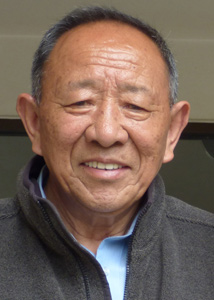 |
Set up upon a hill nearby were machine guns and artilleries. From up there the Chinese could fire any number of shots at the escape route. My father and two other men charged there even as the Chinese were firing because without capturing this spot, none of the large number of sons, daughters, aged parents could have escaped. We were around 2,000 people. That day they were bombing from the planes and firing machine guns. My father was injured. That day we lost many men. There were many casualties from other families, too. I felt my heart break. Looking at my father, there was no chance of his survival. And then we fled. There were no able or older men, all were left behind. We were 16, 17, 18 year olds, old men, and women with guns who were very fierce. The Chinese cavalry came galloping. There was a hillock and if they reached it, there was no way for our escape. We had to reach there and so we raced. Once there, leaving the horses, we lay down and took aim while the Chinese horses came rushing. In the firing all the men fell on the ground but we did not know how many were killed and how many not. We were able to hold them off that evening and the people fled through the valley. |
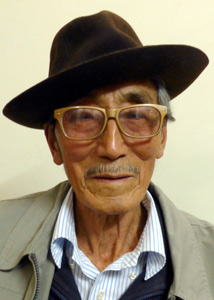 |
Since I had fought many times and suffered much at the hands of the Chinese, there was not any fear. I never thought, “I dare not fight.” One was young and enthusiastic. Just before reaching Kyimdong in Kongpo I was injured. A machine gun fired four shots into my horse. One ricocheted and hit me and I fell off the horse. My colleague picked me up and bound me to the horse and took me away to a forest in the night. My whole body was numb. “Though you have been hit, the bullet has not penetrated. You need not worry,” I could hear him softly saying. Daylight began but one could not remain there, as the Chinese might arrive; the Chinese were in pursuit. There was no place to rest or sleep. As dusk fell, we fled into the night and then arrived in Mustang [Nepal] through Tsari. I possessed a very fine protective amulet. Generally, one is protected by the amulet but one does have a certain nature of success, which makes a lot of difference. When one’s nature of success is high, the protective amulet protects and bullets go whizzing by and none hits the person. If one’s nature of success is low, even with a good protective amulet one gets hit. |
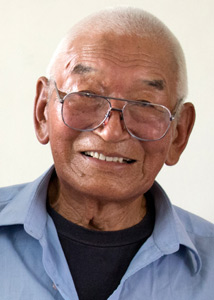 |
Initially, when the resistance force was organized there were a lot of people. There were the people of three districts and those of us who had fled [from our hometowns]. It was a large number. The Americans provided weapons and it seemed to be a good one, but the Chinese attacked. Within three days it was turned into dust. Those that were killed were killed, those that were captured were captured and those of us who could escape, escaped. There was nowhere else to run but into the forest. There was no other place to flee or stay in. When the Chinese started attacking, we ran away and up a mountain pass with the Chinese in pursuit. We reached the top of the pass and then a rocky area. We took hold of the rocky area and exchanged fire the whole of that day. The Chinese were lower down and sent up men in twos and threes. We continued to fire upon those that advanced. Then it became late. It was around the time of dusk that I ran out of bullets--ran out of bullets for the gun. When there were no more bullets, I struck the gun on a rock and threw it away where the Chinese would not see it. That night we tried to find the way to Shopado and reached there. At Shopado we surrendered to the Chinese. We had nowhere to go, no guns, nothing. Having nothing, we surrendered to the Chinese. Then we were driven from Shopado to Lhozong and imprisoned at Lhozong, imprisoned for a year in Lhozong. I was in the prison in Dhartsedo for around a year. And then from Dhartsedo I was taken to the district of Derge. I was put in prison at Derge District for around three years. |
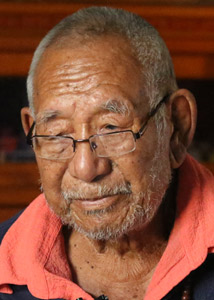 |
One went to Mustang with just the thought of fighting the Chinese. We wanted to put up a challenge, thinking, “It matters not if I died or anything happened.” There were mountains with snow at the top and rocks below where we stayed, and also under rocks on nearby mountains. That was how we moved about. Earlier one did not know how to hide or sprint. One sprinted directly and charged directly. We fought like children did. If one had a knife at the waist, one just drew it and charged. So there was no way to succeed. It was not possible since the Chinese had good weapons." There were many encounters during which we fought the Chinese and there were casualties on our side, too. There were some that were killed on their side. Many encounters took place. However, in order to go to Tibet…it was impossible at the beginning because there was no food. One was hungry and without clothes. One plucked grass and the leaves of trees to spread underneath and used a flat stone as pillow and slept among the grass. We even ate the hide of animals by shaving off the fur and boiling it. After I had been in the force for a few years, I was appointed to look after the animals like yaks, horses and mules and as a messenger to inform the soldiers…for instance to inform you that it was your turn to go or his or mine. I was given this responsibility. So I could not go to the border except a few times. Although I went to the border I did not get to fire on the Chinese. |
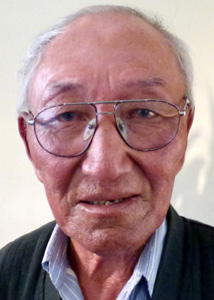 |
It was in the year 1958 that I joined the Chushi Gangdrug [Defend Tibet Volunteer Force]. I was 19 or 20 years old then. And we lost the country in ’59. I was in it for one year. You joined it voluntarily for there was not anyone that forced you to. The older people and relatives, each had their own horses and guns. The weapons we had were the English-made short barrel rifles brought from India that were there since long ago. There were no new guns. Later when the Chushi Gangdrug was in Lhoka weapons were airdropped. You joined voluntarily and the government did not pay a salary or supply weapons. You survived by yourself. There was not any special training in military tactics except for what you already knew. The duties involved being deployed as sentries, as spies, to fight or to block. Groups of 5 or 10 or 20 men were instructed, ""The Chinese will be coming to this place. Go and ambush or block them."" Sometimes you won but most times you lost and died. One could be killed and the group of 50 men scattered. There would be such situations, while sometimes you got to set fire to Chinese houses and attack vehicles. Winning would be when at times you got to attack a vehicle. Sometimes you won but most times you lost. |
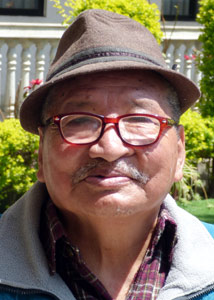 |
There was nowhere else to go but join the Chushi Gangdrug [Defend Tibet Volunteer Force], as I did not wish to remain in the monastery and the time had come for us to go back to the hometown, but returning would have been a problem. My personal thought was similar to what others of the Chushi Gangdrug thought. If possible, drive the Chinese out of Tibet and if not to find a route to escort His Holiness the Dalai Lama abroad. When I joined, I did not even have a gun or a horse. The four of us monks came armed with sticks. Should our leaders order, we were ready to combat face to face and there was no thought of running or hiding then. In our minds we were not scared of the Chinese fear tactics for we went there to die. My reason was for the purpose of Tibet's independence and nothing else. We had to keep watch at night. During the daytime we stayed indoors and at night came out on the road and moved about to prevent the Chinese from venturing out of the military base. There were other soldiers keeping watch at a distance to see that backup Chinese soldiers and weapons did not arrive. At times the Chinese fired guns and at times artilleries. Sometimes they put up loudspeakers and announced, “You have nowhere to run if you wanted to. You will not win in a fight. You have no weapons, no ammunitions. We have guns, weapons, airplanes.” They chided us like that. |

